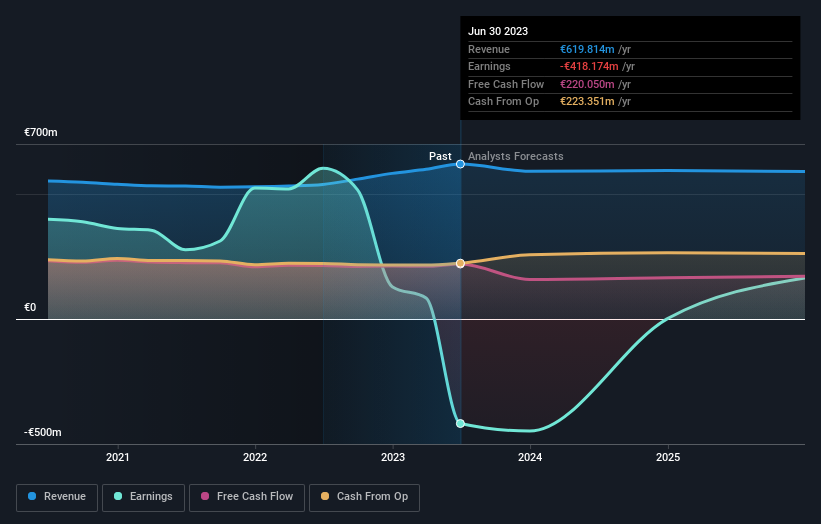Institutions profited after Grand City Properties S.A.'s (ETR:GYC) market cap rose €83m last week but private companies profited the most
Key Insights
Grand City Properties' significant private companies ownership suggests that the key decisions are influenced by shareholders from the larger public
Edolaxia LTD owns 59% of the company
A look at the shareholders of Grand City Properties S.A. (ETR:GYC) can tell us which group is most powerful. The group holding the most number of shares in the company, around 59% to be precise, is private companies. Put another way, the group faces the maximum upside potential (or downside risk).
While private companies were the group that reaped the most benefits after last week’s 5.5% price gain, institutions also received a 22% cut.
Let's take a closer look to see what the different types of shareholders can tell us about Grand City Properties.
Check out our latest analysis for Grand City Properties
What Does The Institutional Ownership Tell Us About Grand City Properties?
Many institutions measure their performance against an index that approximates the local market. So they usually pay more attention to companies that are included in major indices.
We can see that Grand City Properties does have institutional investors; and they hold a good portion of the company's stock. This implies the analysts working for those institutions have looked at the stock and they like it. But just like anyone else, they could be wrong. If multiple institutions change their view on a stock at the same time, you could see the share price drop fast. It's therefore worth looking at Grand City Properties' earnings history below. Of course, the future is what really matters.
We note that hedge funds don't have a meaningful investment in Grand City Properties. Edolaxia LTD is currently the company's largest shareholder with 59% of shares outstanding. This essentially means that they have extensive influence, if not outright control, over the future of the corporation. With 3.3% and 3.2% of the shares outstanding respectively, Candriam, société en commandite par actions and Massachusetts Financial Services Company are the second and third largest shareholders.
While it makes sense to study institutional ownership data for a company, it also makes sense to study analyst sentiments to know which way the wind is blowing. Quite a few analysts cover the stock, so you could look into forecast growth quite easily.
Insider Ownership Of Grand City Properties
The definition of an insider can differ slightly between different countries, but members of the board of directors always count. Management ultimately answers to the board. However, it is not uncommon for managers to be executive board members, especially if they are a founder or the CEO.
Most consider insider ownership a positive because it can indicate the board is well aligned with other shareholders. However, on some occasions too much power is concentrated within this group.
We note our data does not show any board members holding shares, personally. It is unusual not to have at least some personal holdings by board members, so our data might be flawed. A good next step would be to check how much the CEO is paid.
General Public Ownership
With a 19% ownership, the general public, mostly comprising of individual investors, have some degree of sway over Grand City Properties. While this size of ownership may not be enough to sway a policy decision in their favour, they can still make a collective impact on company policies.
Private Company Ownership
Our data indicates that Private Companies hold 59%, of the company's shares. It's hard to draw any conclusions from this fact alone, so its worth looking into who owns those private companies. Sometimes insiders or other related parties have an interest in shares in a public company through a separate private company.
Next Steps:
It's always worth thinking about the different groups who own shares in a company. But to understand Grand City Properties better, we need to consider many other factors. For example, we've discovered 3 warning signs for Grand City Properties (1 is concerning!) that you should be aware of before investing here.
Ultimately the future is most important. You can access this free report on analyst forecasts for the company.
NB: Figures in this article are calculated using data from the last twelve months, which refer to the 12-month period ending on the last date of the month the financial statement is dated. This may not be consistent with full year annual report figures.
Have feedback on this article? Concerned about the content? Get in touch with us directly. Alternatively, email editorial-team (at) simplywallst.com.
This article by Simply Wall St is general in nature. We provide commentary based on historical data and analyst forecasts only using an unbiased methodology and our articles are not intended to be financial advice. It does not constitute a recommendation to buy or sell any stock, and does not take account of your objectives, or your financial situation. We aim to bring you long-term focused analysis driven by fundamental data. Note that our analysis may not factor in the latest price-sensitive company announcements or qualitative material. Simply Wall St has no position in any stocks mentioned.


